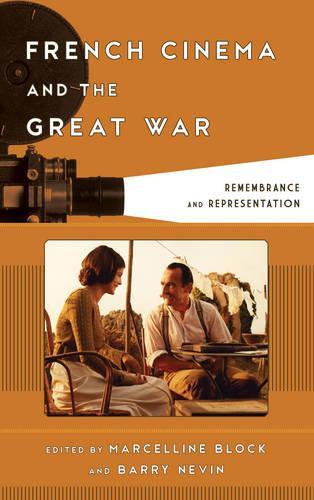
French Cinema and the Great War: Remembrance and Representation
(Hardback)
Publishing Details
French Cinema and the Great War: Remembrance and Representation
By (Author) Marcelline Block
Edited by Barry Nevin
Bloomsbury Publishing PLC
Rowman & Littlefield Publishers
4th February 2016
United States
Classifications
Tertiary Education
Non Fiction
791.430944
Physical Properties
Hardback
204
Width 158mm, Height 238mm, Spine 20mm
422g
Description
Even a century after its conclusion, the devastation of the Great War still echoes in the work of artists who try to make sense of the political, moral, ideological, and economic changes and challenges it spawned. France, the military major power of the Western Front, carries the legacy of battles on its own soil, and countless French lives lost defending the nation from the Central Powers. It is no surprise that the impact of the First World War can still be seen in French films into the present day. French Cinema and the Great War: Remembrance and Representation provides the first book-length study of World War I as it is featured in French cinema, from the silent era to contemporary films. Presented in three thematic sectionsRecording and Remembering the Great War, Women at the Front, and Interrogating Commemorationthe essays in this volume explore the ways in which French film contributes to the restoration and modification of memories of the war. Films such as La Grande Illusion, King of Hearts, A Very Long Engagement, and Joyeux Noel are among those discussed in the volumes examination of the various ways in which film mediates personal and collective memories of this critical historical event. This volume will be an invaluable resource, not only to those interested in French Cinema or the cinema of the Great War, but also to those interested in the impacts of war, more generally, on the cultural output of nations torn by the violence, death, and destruction of military conflict.
Reviews
The close readings here are strong, and on the whole the writing is lively and concise, with chapters divided into three sections: Recording and Remembering the Great War; Women at the Front; and a third section devoted expressly to Jean Renoir's La Grande illusion (1937). * Journal of Popular Film and Television *
Block and Nevin have put together an excellent, ably edited collection of essays on French cinema and WW I. Though all the usual films that one might expect in such a collection are here, there are also some interesting outliers. One example is experimental filmmaker Germaine Dulacs Le cinma au service de l'histoire (1935), a rediscovered six-reel montage film using newsreels of the period to create a sort of collage of the events of the war. Among the more outr films are Une page de gloire (1915) and The Little American (1917), to say nothing of Philippe de Brocas King of Hearts (1966), originally Le roi de coeur, a romantic comedy (set in the last days of the Great War) in which the inmates of an insane asylum escape and take over a small French village. Of course, no such book would be complete without Jean Renoirs La Grande Illusion (1937), perhaps the greatest antiwar film ever made, which is the subject of several essays. Including detailed footnotes, this admirable, compelling volume could also serve as a course text. Summing Up: Highly recommended. Upper-division undergraduates through faculty and professionals; general readers. * CHOICE *
[A] fantastic new book. * Culturethque *
Author Bio
Marcelline Block is lecturer in history at Princeton University. She is the editor of Situating the Feminist Gaze and Spectatorship in Postwar Cinema (2010) and author of World Film Locations: Paris (2011). Barry Nevin has lectured on realist cinema and film theory, the classic French cinema (1930-1960), and modern French history. His research on Renoirs pro-colonial propaganda will be published in Studies in French Cinema.
